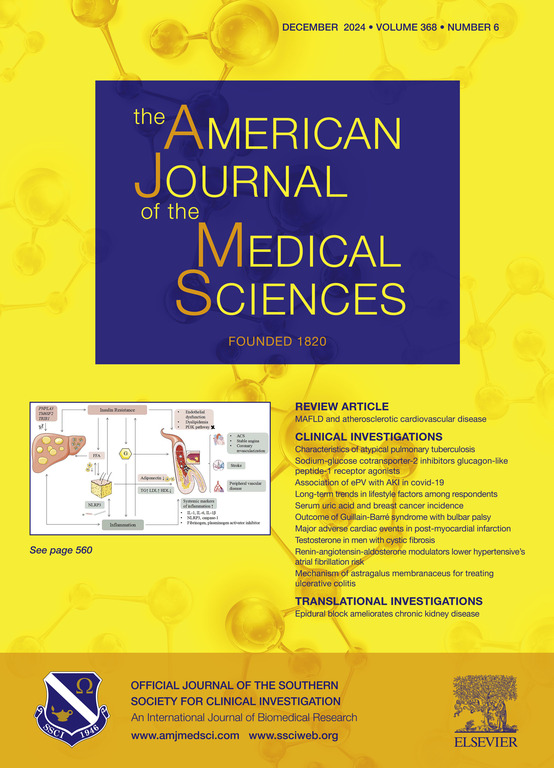TGF-β induces a decrease in CAPZA1 expression to promote the invasiveness of hepatocellular carcinoma cells
IF 1.8
4区 医学
Q2 MEDICINE, GENERAL & INTERNAL
引用次数: 0
Abstract
Background
CAPZA1 is underexpressed in hepatocellular carcinoma (HCC), and its downregulation promotes the epithelial–mesenchymal transition of HCC cells by regulating F-actin remodeling. However, the role of CAPZA1 in enhancing the invasiveness of HCC cells and the mechanism underlying its low expression in this context remain unclear. Therefore, in the present study, we investigated the molecular mechanism underlying the downregulated CAPZA1 expression and its role in enhancing the invasiveness of HCC cells.
Methods
The molecular mechanism of TGF-β-induced low CAPZA1 expression was explored using in vitro and in vivo models. RNA interference and lentiviral infection were used to modulate CAPZA1 expression, and plasmid transfection was used to modulate GATA3 expression. We confirmed the transcriptional regulation of CAPZA1 by GATA3 through a ChIP assay. Additionally, we employed a FITC-gelatin degradation experiment to evaluate the invasiveness of HCC cells. Immunofluorescence analysis was used to examine the co-localization of F-actin with cortactin, as well as of F-actin with black spots in FITC-gelatin, thereby quantifying invadopodia of HCC cells. Finally, we observed the effect of the TGF-β/GATA3/CAPZA signaling pathway on HCC metastasis by inhibiting TGF-β with small-molecule inhibitors in nude mice.
Results
Downregulation of CAPZA1 promoted the invasiveness of HCC cells by regulating invadopodia marker expression, quantity, and function. GATA3 was identified as a transcription factor that regulates CAPZA1 expression, and TGF-β inhibited CAPZA1 expression by inducing low GATA3 expression. The small-molecule inhibitor SB431542, which targets the TGF-β signaling pathway, effectively suppressed HCC metastasis in nude mice and concurrently inhibited CAPZA expression in HCC tissues.
Conclusions
TGF-β lowers the expression of the transcription factor GATA3, thereby downregulating CAPZA1 expression and enhancing the invasiveness of HCC cells, possibly by regulating invadopodia formation. Targeting the TGF-β/GATA3/CAPZA1 signaling pathway can effectively inhibit HCC metastasis.
TGF-β诱导CAPZA1表达降低,促进肝癌细胞侵袭。
背景:CAPZA1在肝细胞癌(HCC)中低表达,其下调通过调节F-actin重塑促进HCC细胞上皮-间质转化。然而,CAPZA1在增强HCC细胞侵袭性中的作用及其在这种情况下低表达的机制尚不清楚。因此,在本研究中,我们研究了CAPZA1表达下调的分子机制及其在HCC细胞侵袭性增强中的作用。方法:采用体外和体内模型,探讨TGF-β-诱导CAPZA1低表达的分子机制。通过RNA干扰和慢病毒感染调节CAPZA1的表达,通过质粒转染调节GATA3的表达。我们通过ChIP实验证实了GATA3对CAPZA1的转录调控。此外,我们采用fitc -明胶降解实验来评估HCC细胞的侵袭性。采用免疫荧光法检测f -肌动蛋白与接触蛋白的共定位,以及fitc -明胶中f -肌动蛋白与黑点的共定位,从而定量肝癌细胞的浸润。最后,我们用小分子抑制剂抑制TGF-β,观察TGF-β/GATA3/CAPZA信号通路对肝癌转移的影响。结果:下调CAPZA1通过调节浸润细胞标志物的表达、数量和功能,促进HCC细胞的侵袭性。GATA3是调节CAPZA1表达的转录因子,TGF-β通过诱导GATA3低表达抑制CAPZA1表达。靶向TGF-β信号通路的小分子抑制剂SB431542能有效抑制裸鼠HCC转移,同时抑制HCC组织中CAPZA的表达。结论:TGF-β通过下调转录因子GATA3的表达,从而下调CAPZA1的表达,增强HCC细胞的侵袭性,其机制可能是通过调节浸润足形成。靶向TGF-β/GATA3/CAPZA1信号通路可有效抑制HCC转移。
本文章由计算机程序翻译,如有差异,请以英文原文为准。
求助全文
约1分钟内获得全文
求助全文
来源期刊
CiteScore
4.40
自引率
0.00%
发文量
303
审稿时长
1.5 months
期刊介绍:
The American Journal of The Medical Sciences (AJMS), founded in 1820, is the 2nd oldest medical journal in the United States. The AJMS is the official journal of the Southern Society for Clinical Investigation (SSCI). The SSCI is dedicated to the advancement of medical research and the exchange of knowledge, information and ideas. Its members are committed to mentoring future generations of medical investigators and promoting careers in academic medicine. The AJMS publishes, on a monthly basis, peer-reviewed articles in the field of internal medicine and its subspecialties, which include:
Original clinical and basic science investigations
Review articles
Online Images in the Medical Sciences
Special Features Include:
Patient-Centered Focused Reviews
History of Medicine
The Science of Medical Education.

 求助内容:
求助内容: 应助结果提醒方式:
应助结果提醒方式:


